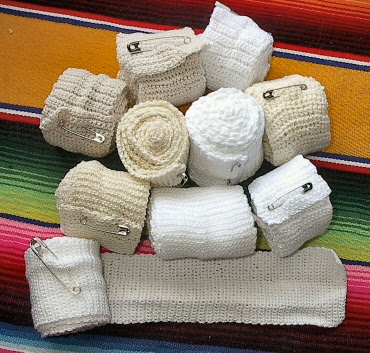Touch the Leper
Luke 5:12-16
12While he was in one of the
cities, there came a man full of leprosy. And when he saw Jesus, he fell on his
face and begged him, “Lord, if you will, you can make me clean.” 13And Jesus stretched out his
hand and touched him, saying, “I will; be clean.” And
immediately the leprosy left him. 14And
he charged him to tell no one, but “go and show
yourself to the priest, and make an offering for your cleansing, as Moses
commanded, for a proof to them.” 15But now even more the report about him went abroad, and great
crowds gathered to hear him and to be healed of their infirmities. 16But he would withdraw to
desolate places and pray.
When I was a kid, I used to watch my mom crochet bandages
for the lepers. She made piles of them and then gave them to the organization
at church that collected them and sent them to a leper colony much as the women
of our congregation today make quilts to send around the world. Today, the specific
disease of leprosy is called Hansen’s disease. It is not contagious and can be
fairly successfully controlled with medication. In the Bible the word “Leprosy”
is used to cover a large number of skin disorders and became ubiquitous as a
symbol for sin.
Lepers in the time of Jesus were completely ostracized from
society. They lives outside of the city limits and were generally dependent
upon charity for survival. But of course, Jesus is not troubled by the
restrictions of physical illness. While others ran from the leper, Jesus moves
toward this person. You’ll notice in the text, the leper merely “falls to his
face”. He does not run over to Jesus to ask for help but falls before Him and
says, “Lord, if you will, You can make me
clean.” Jesus says “be clean” and
that is what he is – clean. Jesus does not run from the infected but instead
reaches out to us.
The
significance of Jesus’ action is more striking when considered in light of OT
theology. The purpose of the OT laws regarding holy, clean, and unclean was to
enable God in his grace to dwell in the midst of his people. Since God is holy,
and fallen humanity is infected with sin, God’s presence posed the threat of
punishment. Indeed, contact with God resulted in swift and severe judgment when
the laws of holiness were violated. But the laws provided a sacrificial,
atoning means through which God’s people might be deemed clean in God’s sight,
so that God’s presence would be in terms of Gospel instead of Law and
condemnation.
Just,
A. A., Jr. ©1996. Luke 1:1–9:50 (pp.
212–213). St. Louis, MO: CPH.
The significance of the direction of the action here cannot
be overlooked. Jesus reaches out to the
leper. That sentence could just as easily be written Jesus reaches out to ________________________. Insert your name on
the line. Jesus reaches out to each one of use, even though we are completely
infected with sin. Instead of our sin infecting Him, His holiness is imparted
to us through His death and resurrection. Jesus departs radically from the OT
holiness code when he, the new temple, the new location of the incarnational
presence of God, deliberately approaches an unclean person and touches him. An
unclean person was to keep away from God, but God in Christ sought out such a
person. Instead of the unclean person being struck down or consumed by fire,
Jesus cleanses him. In place of deadly Law, the holiness of God in Christ has a
Gospel effect as Jesus brings healing and salvation.




Comments
Post a Comment